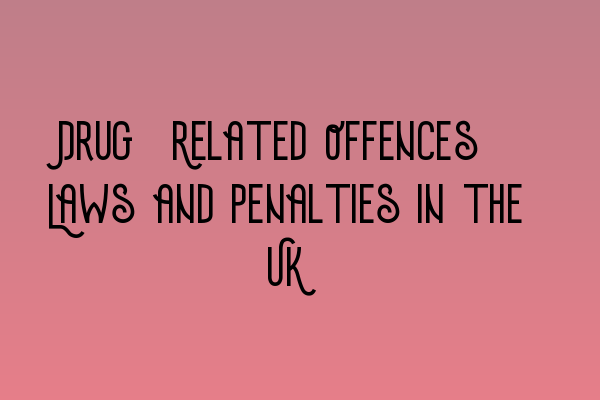Drug-Related Offences: Laws and Penalties in the UK
Drug-related offences are a serious matter in the United Kingdom. The possession, production, supply, and trafficking of controlled substances are strictly regulated and carry heavy penalties. As a solicitor specializing in criminal law and practice at SQE Criminal Law & Practice Law UK, I understand the importance of staying informed about the laws and penalties surrounding drug offences.
Understanding Controlled Substances
Before diving into the specifics of drug-related offences, it’s crucial to understand what constitutes a controlled substance in the UK. The Misuse of Drugs Act 1971 categorizes drugs into three classes: Class A, Class B, and Class C.
Class A drugs include substances like heroin, cocaine, ecstasy, and LSD. Class B drugs consist of cannabis, amphetamines, and synthetic cannabinoids. Class C drugs encompass substances such as anabolic steroids, prescription sedatives, and some tranquilizers.
It is important to stay up to date with the current list of controlled substances, as changes may occur over time.
Drug Possession
Possession of a controlled substance without a valid prescription is a criminal offence in the UK. The penalties for drug possession vary depending on the class of the substance and the quantity involved.
For Class A drugs, the maximum penalty for possession is up to seven years imprisonment and an unlimited fine. Possession of Class B drugs can result in up to five years imprisonment and an unlimited fine. Possession of Class C drugs carries a maximum penalty of two years imprisonment and an unlimited fine.
If an individual is found in possession of a larger quantity of drugs than what is considered for personal use, they may face additional charges of possession with intent to supply, which carries even harsher penalties.
Drug Production and Supply
The production and supply of controlled substances are serious criminal offences. Anyone involved in the process of manufacturing drugs or supplying them to others can face severe penalties, including lengthy prison sentences.
The penalties for drug production and supply are determined based on various factors, such as the class of the drug, the quantity involved, and the level of involvement in the operation. Those found guilty of these offences can expect significant prison terms and substantial fines.
It’s worth noting that drug trafficking is also considered a serious offence under UK law. Trafficking involves the transportation and distribution of drugs, often on a larger scale. The penalties for drug trafficking are among the most severe, with lengthy prison sentences and substantial fines being common.
The Role of Intent
When it comes to drug-related offences, intent plays a crucial role in determining the severity of the penalties. If an individual is found to have the intent to sell or supply drugs, the charges and penalties will likely be more severe than if the drugs were solely for personal use.
Proving intent can be challenging, and it’s essential to have an experienced solicitor who understands the intricacies of drug laws to navigate such cases effectively.
Seeking Legal Advice
If you or someone you know is facing drug-related charges, it’s crucial to seek legal advice from a qualified solicitor specializing in criminal law. At SQE Criminal Law & Practice Law UK, our team of expert solicitors has extensive experience in handling drug-related offences.
With our in-depth knowledge of drug laws and penalties, we can provide you with the guidance and representation needed to protect your rights and achieve the best possible outcome for your case.
For more information about related legal topics, consider reading our other articles:
- SQE Exam Prep: Essential Study Materials for Aspiring Solicitors
- Demystifying the Solicitors Qualifying Examination Format
- SQE Exam for International Lawyers: Challenges and Success Strategies
- LLC Formation Made Simple: Step-by-Step Guide for UK Entrepreneurs
- LLC Formation: A Step-by-Step Guide for UK Entrepreneurs
Remember, being knowledgeable about drug-related offences and seeking proper legal counsel is crucial for your defense. Reach out to SQE Criminal Law & Practice Law UK today to protect your rights and receive expert legal representation.
